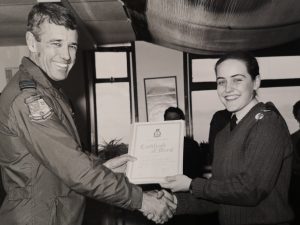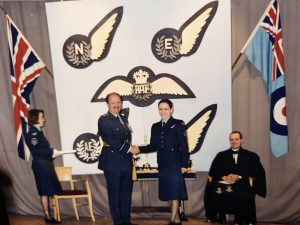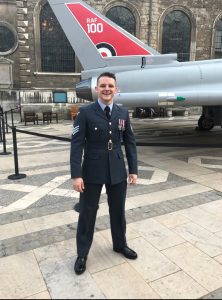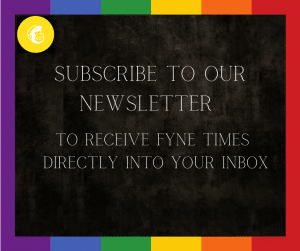In January 2000, the ban on gay personnel serving in the armed forces was lifted. Twenty years on from the abolition of the ‘gay ban’, we speak to Sgt Craig Rudyk-Smith, who joined the Royal Air Force after the ban was lifted, and Flt Lt Tamsin Wakeham, who joined before and re-joined shortly afterwards. Both discuss their experiences as queer people in the RAF, and the ways in which the organisation has improved, including the introduction of the Freedom Network, which ensures support and inclusivity for the LGBTQ+ community and other minority groups.


 just the military though, even working in Barclays was the same, the only difference being that you probably couldn’t lose your job at a bank. That was the craziness of it – I’d come out on top of my course, I’d shown aptitude for air traffic, I’d won the merit award, yet you care about who I sleep with. Why should I lose my job for that? I was stationed at RAF Brawdy in South Wales and there was a US Naval facility attached to it. I started seeing one of the women there, and her roommate got wind of it. She was the one who dobbed us in to the naval investigation services, who passed it on to the Royal Air Force security services. They then came to investigate us. Back in the 90s it was pretty much witch-hunting, especially with the US Navy, they would climb up trees and try to take photos of people. The RAF wasn’t quite so bad but they were certainly looking for it. They would go to gay bars looking for people, trying to catch you. I was in the air traffic tower when I got called out of my work and escorted to the police section. There were two women there who asked me about it all, which lasted for several hours. Halfway through, they said, “We want to search your room, can we do that?” I said, “I’d really rather you didn’t.” But it had obviously gone through all the channels up to the highest level and they had already been given the approval. I had to escort them to my room where they pulled it apart. They said they could tell I was ‘one of those’ because I had a picture of Marilyn Monroe up on my wall. People didn’t really understand what being gay was back then. I wasn’t allowed into my room during the search, so I had to stand outside while I watched them rip it apart. Of course, there were people coming and going in the block and so the rumour mill started and never really stopped. One of the most damaging things and something that still irritates me, is that all of my stuff was held for a year until the investigation ended. I didn’t get that stuff back until an RAF police officer came to me and said, “Tam, your stuff is all at the station, just thought you should know because they’re showing it to new people who come in.” I can’t imagine this would happen these days, but because in those days it was so unusual to be gay, the people in the police section were showing it to new people, like, “This is Tam, she’s one of the gay people on campus.” That was quite horrific. After my room was searched, I had to go back and be interrogated for a further few hours where they questioned me about every single item that they’d taken away. I bullshitted because I was so scared about losing my job. I just denied, denied, denied. After that, it continued. They kept asking other people, they kept watching us – we couldn’t really see each other on camp, we had to stay separate – until finally they realised that they couldn’t really prove anything, so had to drop all the charges about a year later. But the damage was done. I stayed in the military but you’re still that person, aren’t you? It had a knock-on effect on how people looked at me and how I interacted with people. I then didn’t tell people at my next post in Germany, I would lie that I had a boyfriend back in the UK to take the heat off, and people just believed that.
just the military though, even working in Barclays was the same, the only difference being that you probably couldn’t lose your job at a bank. That was the craziness of it – I’d come out on top of my course, I’d shown aptitude for air traffic, I’d won the merit award, yet you care about who I sleep with. Why should I lose my job for that? I was stationed at RAF Brawdy in South Wales and there was a US Naval facility attached to it. I started seeing one of the women there, and her roommate got wind of it. She was the one who dobbed us in to the naval investigation services, who passed it on to the Royal Air Force security services. They then came to investigate us. Back in the 90s it was pretty much witch-hunting, especially with the US Navy, they would climb up trees and try to take photos of people. The RAF wasn’t quite so bad but they were certainly looking for it. They would go to gay bars looking for people, trying to catch you. I was in the air traffic tower when I got called out of my work and escorted to the police section. There were two women there who asked me about it all, which lasted for several hours. Halfway through, they said, “We want to search your room, can we do that?” I said, “I’d really rather you didn’t.” But it had obviously gone through all the channels up to the highest level and they had already been given the approval. I had to escort them to my room where they pulled it apart. They said they could tell I was ‘one of those’ because I had a picture of Marilyn Monroe up on my wall. People didn’t really understand what being gay was back then. I wasn’t allowed into my room during the search, so I had to stand outside while I watched them rip it apart. Of course, there were people coming and going in the block and so the rumour mill started and never really stopped. One of the most damaging things and something that still irritates me, is that all of my stuff was held for a year until the investigation ended. I didn’t get that stuff back until an RAF police officer came to me and said, “Tam, your stuff is all at the station, just thought you should know because they’re showing it to new people who come in.” I can’t imagine this would happen these days, but because in those days it was so unusual to be gay, the people in the police section were showing it to new people, like, “This is Tam, she’s one of the gay people on campus.” That was quite horrific. After my room was searched, I had to go back and be interrogated for a further few hours where they questioned me about every single item that they’d taken away. I bullshitted because I was so scared about losing my job. I just denied, denied, denied. After that, it continued. They kept asking other people, they kept watching us – we couldn’t really see each other on camp, we had to stay separate – until finally they realised that they couldn’t really prove anything, so had to drop all the charges about a year later. But the damage was done. I stayed in the military but you’re still that person, aren’t you? It had a knock-on effect on how people looked at me and how I interacted with people. I then didn’t tell people at my next post in Germany, I would lie that I had a boyfriend back in the UK to take the heat off, and people just believed that.

